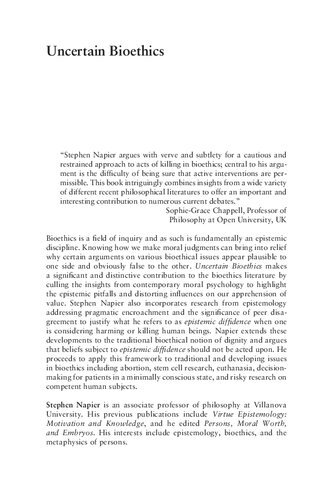

Most ebook files are in PDF format, so you can easily read them using various software such as Foxit Reader or directly on the Google Chrome browser.
Some ebook files are released by publishers in other formats such as .awz, .mobi, .epub, .fb2, etc. You may need to install specific software to read these formats on mobile/PC, such as Calibre.
Please read the tutorial at this link. https://ebooknice.com/page/post?id=faq
We offer FREE conversion to the popular formats you request; however, this may take some time. Therefore, right after payment, please email us, and we will try to provide the service as quickly as possible.
For some exceptional file formats or broken links (if any), please refrain from opening any disputes. Instead, email us first, and we will try to assist within a maximum of 6 hours.
EbookNice Team

Status:
Available4.3
34 reviewsBioethics is a field of inquiry and as such is fundamentally an epistemic discipline. Knowing how we make moral judgments can bring into relief why certain arguments on various bioethical issues appear plausible to one side and obviously false to the other. Uncertain Bioethics makes a significant and distinctive contribution to the bioethics literature by culling the insights from contemporary moral psychology to highlight the epistemic pitfalls and distorting influences on our apprehension of value. Stephen Napier also incorporates research from epistemology addressing pragmatic encroachment and the significance of peer disagreement to justify what he refers to as epistemic diffidence when one is considering harming or killing human beings. Napier extends these developments to the traditional bioethical notion of dignity and argues that beliefs subject to epistemic diffidence should not be acted upon. He proceeds to apply this framework to traditional and developing issues in bioethics including abortion, stem cell research, euthanasia, decision-making for patients in a minimally conscious state, and risky research on competent human subjects.